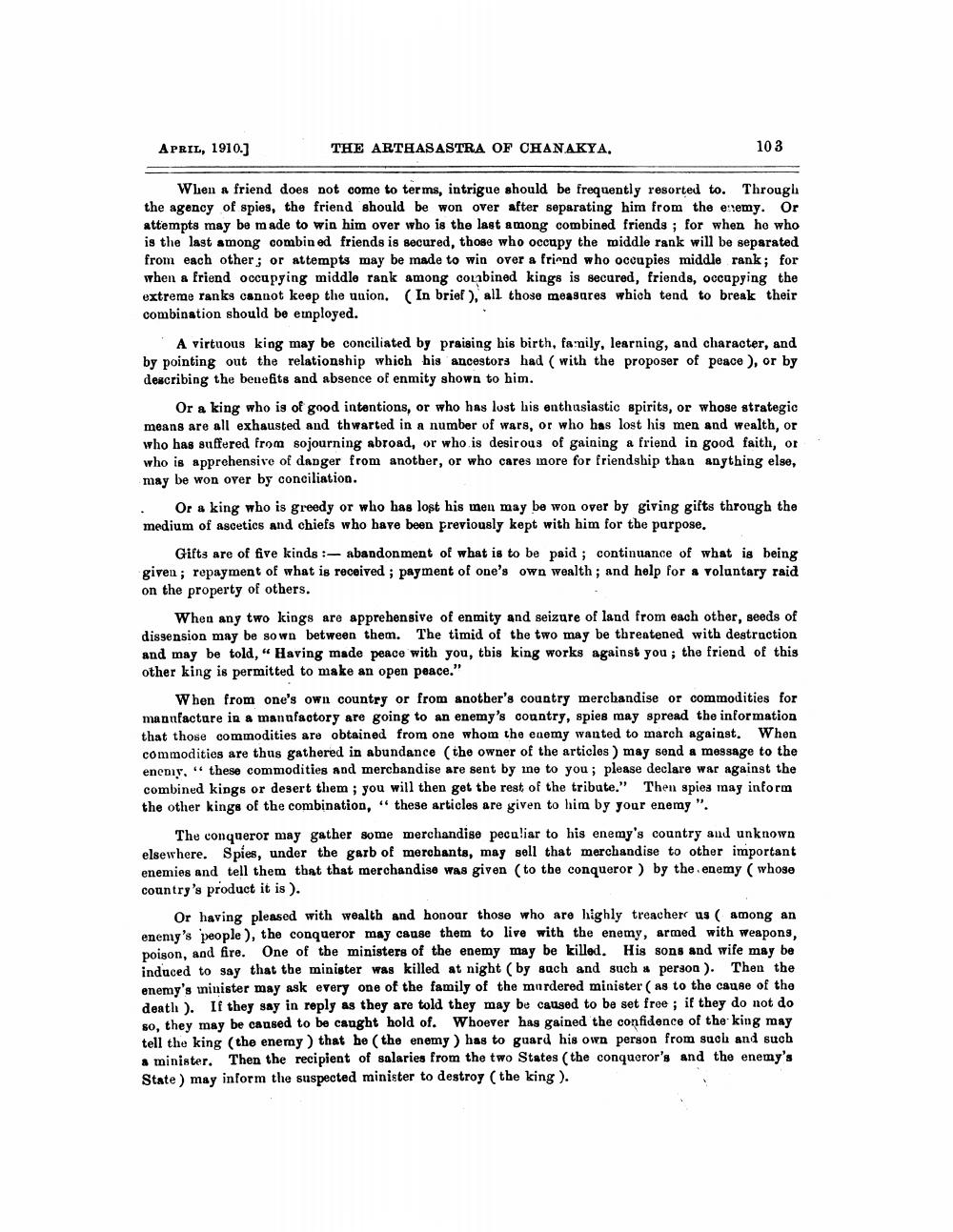________________
APRIL, 1910.)
THE ARTHASASTRA OF CHANAKYA.
103
When a friend does not come to terms, intrigue should be frequently resorted to. Through the agency of spies, the friend should be won over after separating him from the elemy. Or attempts may be made to win him over who is the last among combined friends ; for when he who is the last among combined friends is secured, those who occupy the middle rank will be separated from each other; or attempts may be made to win over a friend who occupies middle rank; for when a friend occupying middle rank among corabined kings is secured, friends, occupying the extreme ranks cannot keep the union. (In brief ), all those measures which tend to break their combination should be employed.
A virtuous king may be conciliated by praising his birth, fa nily, learning, and character, and by pointing out the relationship which his ancestors had ( with the proposer of peace ), or by describing the benefits and absence of enmity shown to him.
Or a king who is of good intentions, or who has lost his enthusiastic spirits, or whose strategic means are all exhausted and thwarted in a number of wars, or who has lost his men and wealth, or who has suffered from sojourning abroad, or who is desirous of gaining a friend in good faith, or who is apprehensive of danger from another, or who cares more for friendship than anything else, may be won over by conciliation. . Or a king who is greedy or who has lost his men may be won over by giving gifts through the medium of ascetics and chiefs who have been previously kept with him for the parpose.
Gifts are of five kinds :- abandonment of what is to be paid ; continuance of what is being given ; repayment of what is received ; payment of one's own wealth ; and help for a voluntary raid on the property of others.
When any two kings are apprehensive of enmity and seizure of land from each other, seeds of dissension may be sown between them. The timid of the two may be threatened with destruction and may be told, “ Having made peace with you, this king works against you; the friend of this other king is permitted to make an open peace."
When from one's own country or from another's country merchandise or commodities for manufacture in a manufactory are going to an enemy's country, spies may spread the information that those commodities are obtained from one whom the enemy wanted to march against. When commodities are thus gathered in abundance (the owner of the articles ) may send a message to the enemy," these commodities and merchandise are sent by ine to you; please declare war against the combined kings or desert them; you will then get the rest of the tribute." Then spies may inform the other kings of the combination, " these articles are given to him by your enemy".
The conqueror may gather some merchandise peculiar to his enemy's country and unknown elsewhere. Spies, under the garb of merchants, may sell that merchandise to other important enemies and tell them that that merchandise was given (to the conqueror ) by the enemy (whose country's product it is).
Or having pleased with wealth and honour those who are highly treachers us ( among an enemy's people), the conqueror may cause them to live with the enemy, armed with weapons, poison, and fire. One of the ministers of the enemy may be killed. His sons and wife may be induced to say that the minister was killed at night (by such and such a person). Then the enemy's minister may ask every one of the family of the murdered minister ( as to the cause of the death ). If they say in reply as they are told they may be caused to be set free ; if they do not do so, they may be caused to be caught hold of. Whoever has gained the confidence of the king may tell the king (the enemy) that he (the enemy has to guard his own person from such and such a minister. Then the recipient of salaries from the two States (the conqueror's and the enemy's State) may inform the suspected minister to destroy (the king ).




